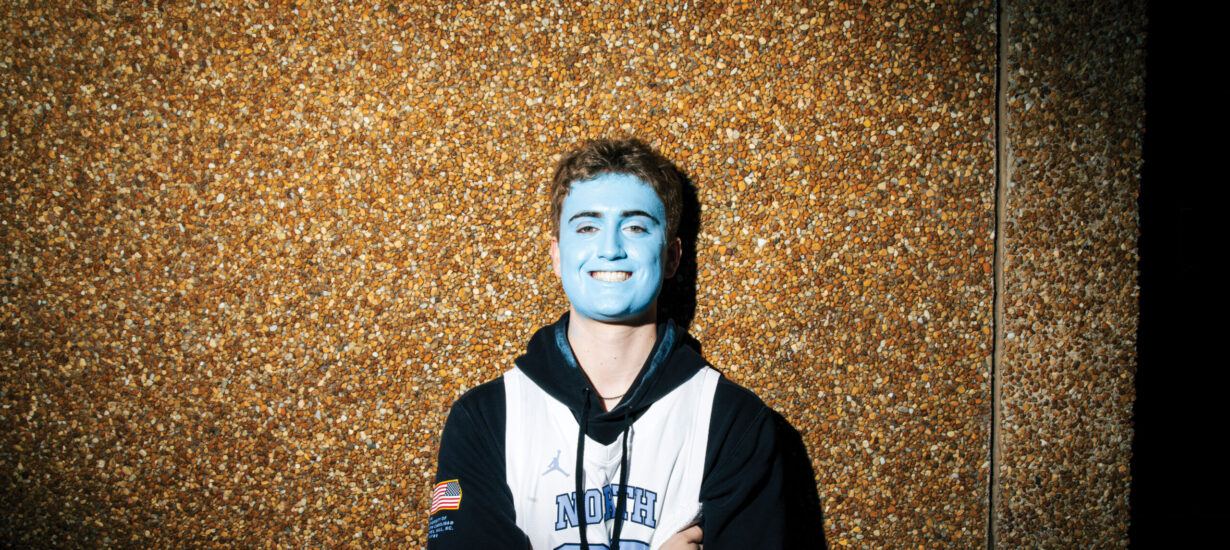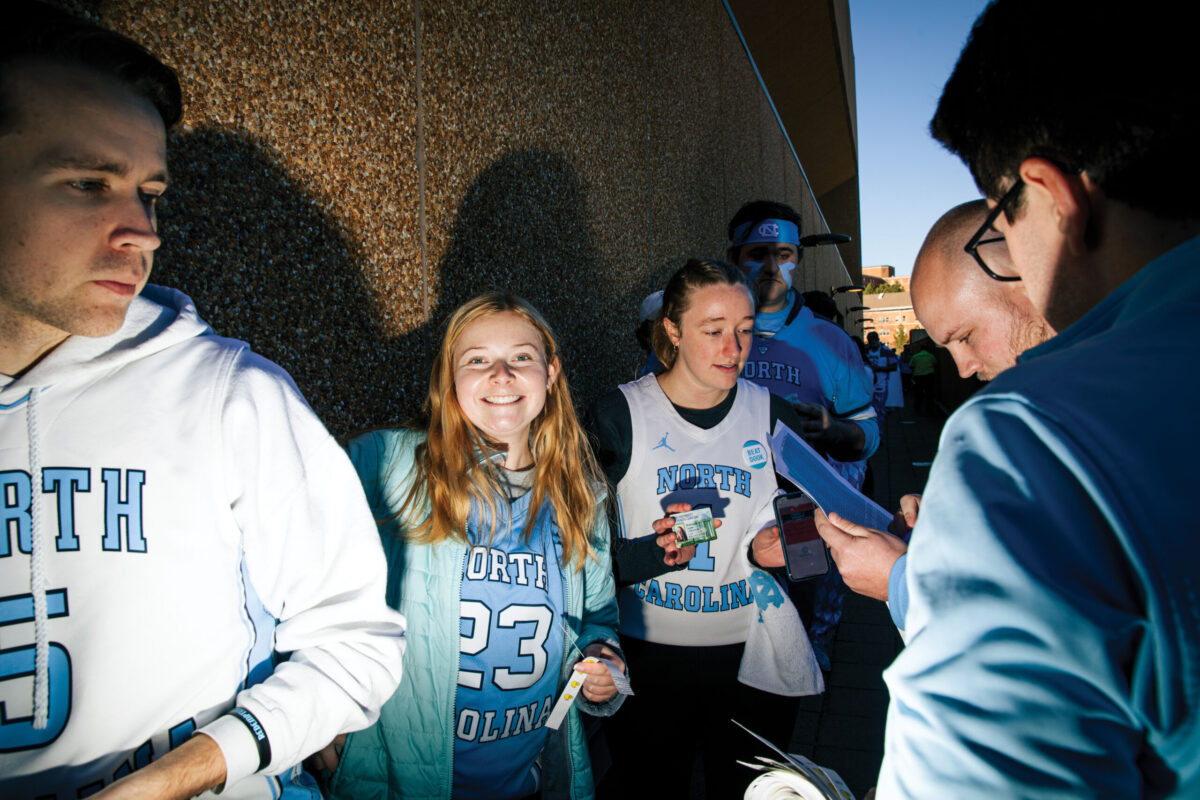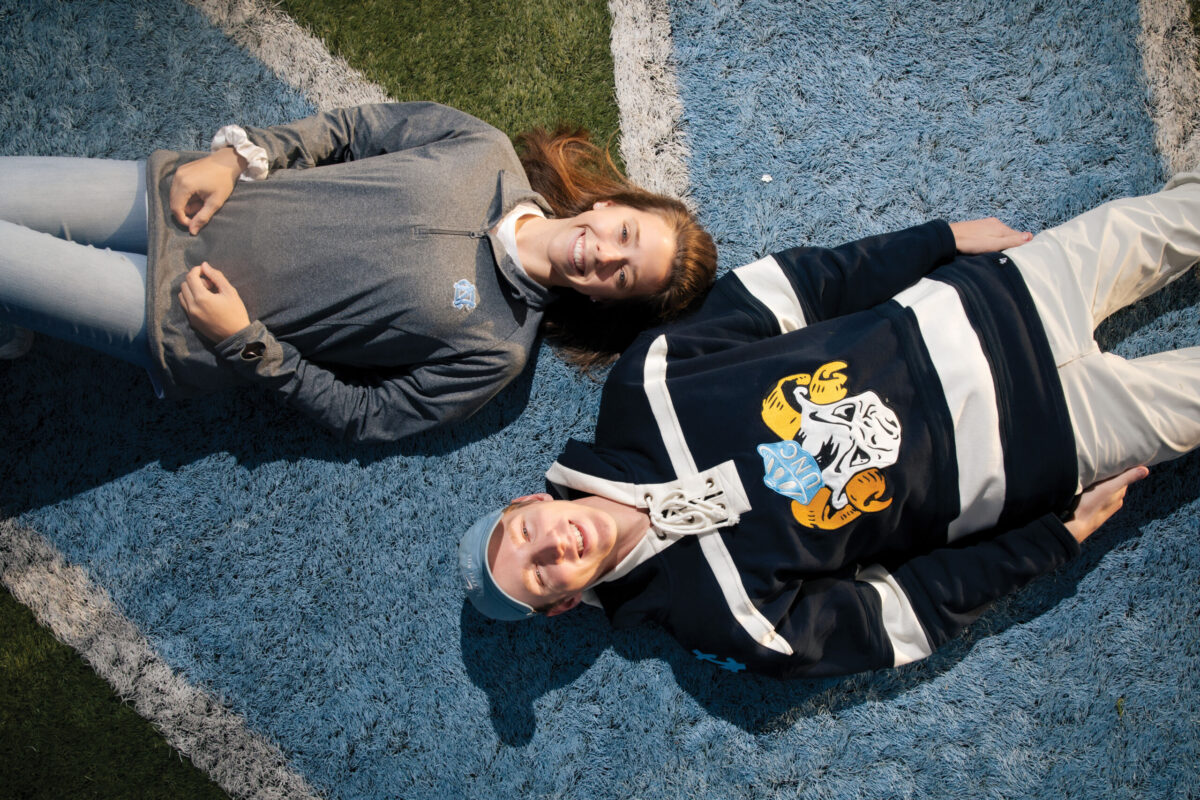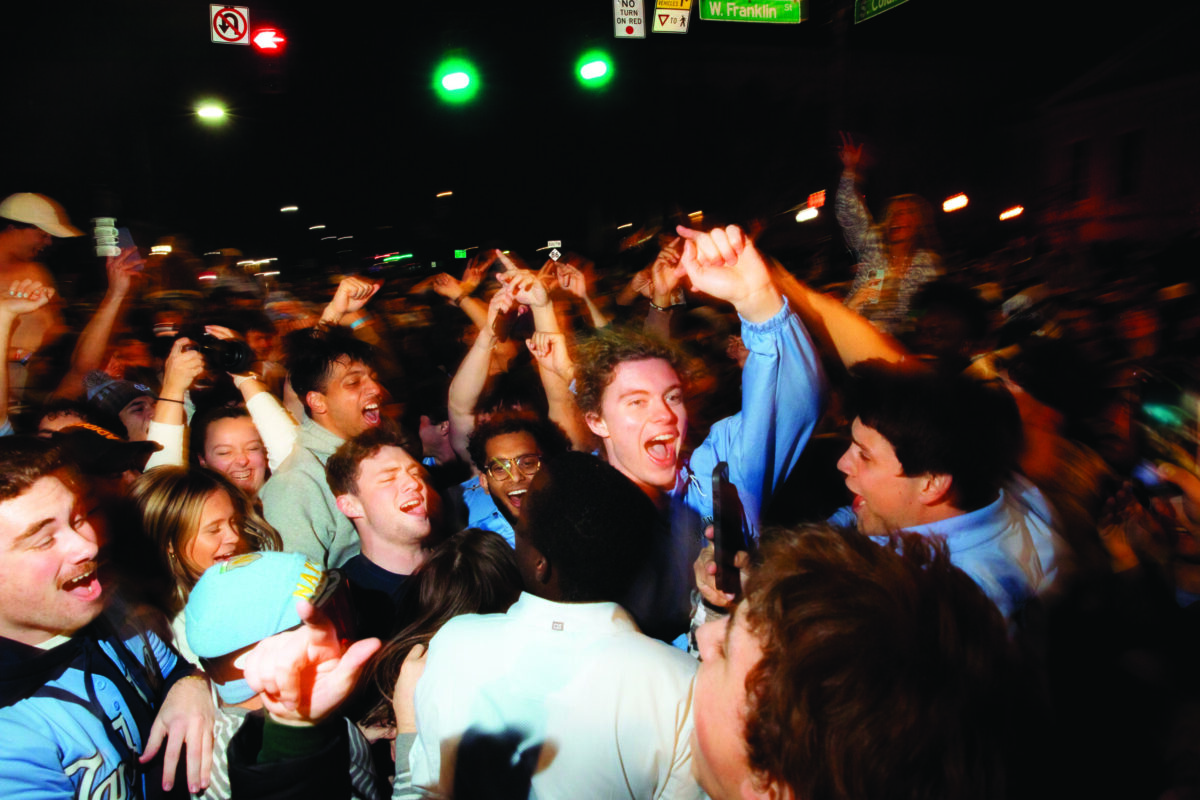Catch Carolina Fever

Students who want tickets to the Duke game show up to support all of Carolina’s sports teams, all year long.
story and photos by Ira Wilder
Tickets to a UNC-Duke men’s basketball game are in high demand — and expensive. A month before the Feb. 3 rivalry game in Chapel Hill, midcourt seats a few rows up from the floor were selling for $7,520 each, according to The Fayetteville Observer.
But alumni know there’s one way certain fans can get tickets for free: be a Carolina student.
Still, it’s not easy. The demand for rivalry tickets among students is massive: For the most recent game, about 15,000 students (roughly half of the student body) requested a ticket. The problem: Only 5,500 spots, or thereabouts, in the 21,750-seat Smith Center are reserved for students. How, then, do the ticketing wizards decide who’s in the Dean Dome and who’s stuck watching the game in a Franklin Street bar?

Outside the Smith Center before the 2024 men’s basketball home game against Duke, Carolina Fever students have their IDs checked to verify that they’re in the correct place in line. (Photo: Ira Wilder)
For most students, it’s a simple lottery. The student ticket lottery system, operated by the Carolina Athletic Ticket Office, emails all students 10 days ahead of the game, and students have 48 hours to enter the lottery by submitting a ticket request through an online portal. For the Duke game, preference is given to seniors. If you’re one of the lucky few to nab a ticket, you’re then randomly assigned to one of five phases, each entering in 30-minute increments, starting with Phase 1 two and a half hours before tip-off. The relatively unlucky ones — they still have a UNC-Duke ticket, after all — are classified as Phase 5, which means a seat in the nosebleed section, below and behind the retired jerseys of Phil Ford ’78 and Tyler Hansbrough ’09 that hang from the rafters. Phases 2 through 4 are in the mid-level seats. Phase 1 tickets, however, get the prime standing-room-only seats on the risers behind the east goal, creating a wild pit of swarming, screaming students.
Phase 1 tickets are Tar Heel gold, but landing one is not completely random. This year, 200 students guaranteed their spots on the risers through a program called Carolina Fever, started in 1986 as a pep rally committee. Fever is a free rewards-based program available only to Carolina students that promotes attendance at all of UNC’s sporting events. Throughout the year, leading up to the rivalry men’s basketball game, students earn Fever points by scanning their phones at the gate of designated events: one point for scanning in before the national anthem and additional points for scanning out after the Alma Mater. Top point earners are guaranteed student tickets to every football and men’s basketball game throughout the year.
Holders of phase 1 tickets, which are Tar Heel gold, get the prime standing-room-only seats on the risers behind the east goal, creating a wild pit of swarming, screaming students. This year, 200 students guaranteed their spots on the risers through a program called Carolina Fever that promotes attendance at all UNC’s sporting events.
As the sun set six days before the Duke game, senior John Hankinson, co-chair of Carolina Fever, finalized Fever’s database after its last event of the year (a Sunday night tennis match) and emailed the ticketing office a list of 200 students who’d earned a guaranteed spot to watch the rivalry matchup. These students entered the Dean Dome in order of who had the most points, each verified by identification and a numbered wristband.
More than 12,900 students participated in Carolina Fever during the year leading up to the Duke game, but Fever doesn’t end with each year’s home rivalry match. Between last year’s home rivalry game and the end of the 2023 spring semester, students could amass points at 12 events. That means returning students can get a head start in collecting points over incoming first-year and transfer students. The advantage has been a part of Fever for years, but it isn’t impossible for first-year students to land a Phase 1 ticket. Hankinson said he knows several first-year students in the top 200. Considering only fall 2023 and spring 2024 events, students with perfect attendance at Fever events earned 66 points, well above the 57 cutoff to qualify for Phase 1 Duke tickets.
Senior Lorena Negron made the cutoff with 59 points. Her favorite part of Fever, besides cheering on Armando Bacot from eight feet away during the Duke game, is the incentive it gives her to make time to hang out with her friends at games, like seniors Caroline Williams and Meredith Jenkins. “Obviously, it’s easier when you go with a friend group because you have other people that keep you accountable,” Negron said.
Williams agreed that going to Carolina Fever events is “a good way to keep in touch, especially because I don’t live with some of them anymore,” she said. “We just go to the games every week.”

UNC seniors Lydia Waddell and John Hankinson are co-chairs of Carolina Fever. “You hear about the Cameron Crazies and how much they do at Duke men’s basketball games, but they don’t really support other teams,” Hankinson said. “That’s something really unique with Fever.” (Photo: Ira Wilder)
Roommates Abigail Moore and Caroline Sevier, both juniors, made it their top priority this year to rack up as many Fever points as possible. Standing at the head of the line of the top 200 Fever students on Duke Day, heat wafting from the open Dean Dome doors, they lamented missing one Fever point this year when students were checked out early at a rainy lacrosse game, and Moore and Sevier, huddled on the other side of the stadium, weren’t aware of the early dismissal.
Moore and Sevier’s mission wasn’t about being first on the risers, though; that was just a symptom of a dedication to Carolina Athletics that is rewarded by Fever. “It just honestly makes me love being a Tar Heel even more,” Moore said. “Because there’s so many sports I go to now that I did not know that we even had.”
Fever promotes involvement with all 28 varsity sports of Carolina Athletics. “You hear about the Cameron Crazies and how much they do at Duke men’s basketball games, but they don’t really support other teams,” Hankinson said. “That’s something really unique with Fever.”
More than 760 students attended a Friday-night gymnastics meet in January and tallied at least one Fever point, and more than 1,000 students received a point each for attending the first field hockey home game Erin Matson ’22 coached, on Aug. 25. Brown Walters ’97, the director of spirit programs at UNC Athletics, said student attendance this year at nonrevenue athletics (almost any sport that’s not football or men’s basketball) has been “unreal.”
“It’s the highest numbers that we’ve ever seen,” said Walters, who has worked with Fever for almost 10 years. Coaches often tell Walters how thankful they are for the energy Fever brings on home game days. Courtney Banghart, head coach of women’s basketball, refers to the Fever kids as her favorite students, according to Hankinson and senior co-chair Lydia Waddell.
In high school, Hankinson played tennis and Waddell played lacrosse. So they know what it’s like to be an athlete in a sport that doesn’t usually attract a lot of fans.
Waddell said the high attendance at less popular sporting events was partly driven by the football and men’s basketball performance. (Men’s basketball had the highest average attendance of any college basketball program in the country last year.) Neal Franzer, assistant athletic director of marketing at UNC Athletics, has a different perspective: “It’s people wanting to see our people succeed.”
Coaches often tell Brown Walters ’97, director of spirit programs at UNC Athletics, how thankful they are for the energy Fever brings on home game days. Courtney Banghart, head coach of women’s basketball, refers to the Fever kids as her favorite students.
Franzer is one of a few full-time employees that bridge the gap between Fever and Athletics. Marketing liaisons like him work closely with coaching staffs each semester to determine which games need the special momentum that a Fever crowd brings. “Coaches want to have every one of their games [be] Fever events,” Franzer said. He said the difference between the energy at Fever games and non-Fever games is “night and day.” For example, a tennis match not on the Fever event list might have 10 students in the stands at the Friday Center, while a Fever tennis match can easily pull a couple hundred students.
“It’s a great way to support other sports where you don’t get as much of a crowd, and you’ve obviously put in the work,” Gabriella Spina, a senior, said while in the Fever line on Duke Day.

Students rushed Franklin Street Feb. 3 after the Heels beat Duke 93–84. (Photo: Ira Wilder)
Nearly a dozen Fever students said they’d put in about 10 hours a week attending events throughout the school year, enough to qualify as a part-time job. And for the students that run the program, it practically is a part-time job. Everything Fever does, from data to marketing to fundraising to game-day affairs, is done by a team of 21 students.
“They work their butts off, to be honest with you,” Walters said. “It’s kind of a thankless job, and it’s got a huge impact on our student body. I just cannot say enough good things about those folks.”
Though they’re not paid — Fever’s student administrators aren’t even guaranteed the tickets they coordinate — Waddell and Hankinson are happy to cheer on the Tar Heels from the front row and know the Dean Dome security guards by name. Waddell said she’s met some of her best friends in college by working with Fever. Her doormat reads, “Welcome to the Fever House.”
It’s impossible to say what every Fever participant’s motivations are — some sources said most students do it for the Duke ticket, others more optimistically said it’s genuinely to support their fellow students — but one thing is certain: The program is beloved by the athletic department. The students are rarely in the stands doing homework. They’re engaged, excited and eager, Walters said.
“Those are the students that we want to reward: the ones that come to everything, the ones that care about our sports,” Franzer said. He believes most Fever students simply see the rivalry game as icing on the cake of Carolina Athletics.
At the rivalry game, all 200 Fever students wore tight-laced running shoes in anticipation for what they hoped would be a sprint from the risers to a victory celebration on Franklin Street. They weren’t disappointed.
Ira Wilder is a senior from Henderson, majoring in public policy and journalism. He is a Morehead-Cain Scholar and an intern for the Review.
Thanks for reading the Carolina Alumni Review
Carolina Alumni members, sign in to continue reading.
Not yet a member? Become one today.
